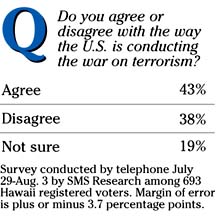

Plurality supports
U.S. war on terror
Republicans and Bush supporters
are the strongest backers
Forty-three percent of Hawaii registered voters agree with how the U.S. government is handling the war on terrorism, a new Star-Bulletin/KITV-4 News poll shows.
 |
Hawaii-based SMS Research conducted the poll of 693 registered voters from July 29 to Aug. 3. The margin of error was plus or minus 3.7 percentage points.
Poll respondents were asked whether they agreed or disagreed "with the way the United States is conducting the war on terrorism."
They were also asked who they intended to vote for in the upcoming presidential election and whether they thought it was "the right or the wrong decision" to go to war against Iraq.
Support for President Bush's war on terrorism was strongest among Republicans -- 73 percent said they backed the effort, 15 disagreed with it and 12 percent were unsure. Almost 27 percent of Democrats supported how the war is being waged, but 55 percent did not and nearly 19 percent were not sure.
Also, 77 percent of respondents who said they planned to vote for Bush were behind the war on terrorism. Sixty-four percent of those who said they backed Democratic presidential hopeful John Kerry disagreed with the military effort.
Three-fourths of those who thought it was the "right decision" to go to war against Iraq also agreed with the war on terrorism.
Sixty-six percent of voters who were against the Iraq war also disagreed with how the nation was combating terror.
Men were more likely to agree with the Bush administration's strategies for reducing terrorism, while about 26 percent of women included in the survey said they were "not sure" on the war's tactics.
About 47 percent of those who were unsure whether America should have gone up against Iraq were also not sure on whether they agreed or disagreed with how the war on terrorism is being conducted.
Young people -- those 18 to 24 -- showed strong dissent for the war on terrorism. Sixty-five percent said they were against it, while 23 percent said they agreed with how it was being conducted.
Opinion in the 35-to-44 age bracket was nearly flipped, with more than half agreeing with the war on terrorism's tactics. Thirty percent in that group disagreed with how the war was being conducted, and 18 percent said they were not sure.
— ADVERTISEMENTS —
— ADVERTISEMENTS —